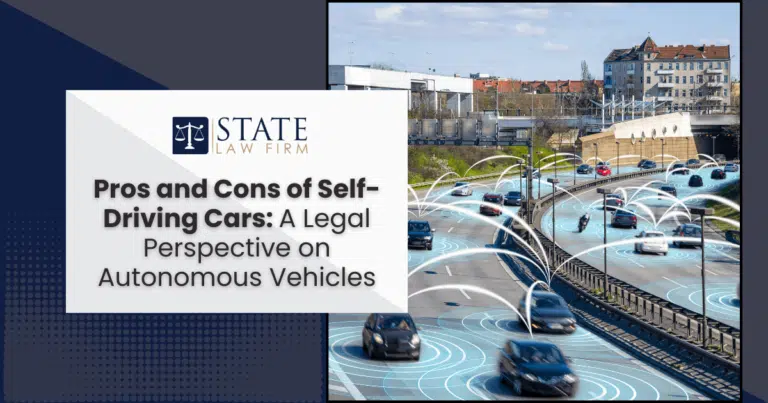The rapid rise of self-driving cars has sparked both excitement and debate across industries, with autonomous vehicle technology promising to redefine the way we travel. From the potential to drastically reduce traffic accidents to addressing accessibility challenges, the possibilities are immense. Yet, alongside these benefits come complex legal questions surrounding liability, regulation, and safety. As a boutique personal injury law firm based in Sherman Oaks, we recognize the profound legal implications this technology brings for drivers, manufacturers, and policymakers alike.
A recent study by the National Highway Traffic Safety Administration (NHTSA) found that human error is responsible for 94% of traffic accidents, emphasizing the critical role autonomous vehicles could play in improving road safety. However, these advancements also raise significant concerns about how liability is determined in accidents involving self-driving cars. Read more here.
In this article, we’ll explore the pros and cons of autonomous vehicles from a legal perspective, discussing key benefits like improved safety and reduced liability, as well as challenges such as regulatory hurdles and ethical dilemmas. For more insights into how evolving technologies impact personal injury law, visit our Sherman Oaks premises liability page.
As young attorneys dedicated to taking on hard cases and evolving as litigators, we aim to provide you with a comprehensive guide to understanding the legal landscape of self-driving cars while helping you navigate the uncertainties this innovation brings.
The Benefits of Self-Driving Cars: Analyzing the Pros from a Legal Standpoint
Self-driving cars promise to revolutionize transportation, offering numerous advantages that extend beyond convenience. From a legal perspective, these benefits are significant:
- Reduction in Human Error: With autonomous vehicles, the potential for accidents caused by distracted driving, fatigue, or impairment diminishes. According to Tesla’s Vehicle Safety Report, vehicles operating on Autopilot experienced approximately one accident for every 4.31 million miles driven in 2021, compared to one every 484,000 miles for conventional cars.
- Liability Reduction for Drivers: As control shifts from humans to machines, individual drivers may face reduced liability in accidents. This shift could lead to clearer determinations of fault, simplifying legal proceedings and potentially lowering insurance premiums.
- Improved Traffic Safety: Autonomous vehicles are programmed to adhere strictly to traffic laws, reducing incidents caused by speeding or aggressive driving. This compliance can lead to safer roads and fewer legal disputes arising from traffic violations.
- Accessibility for Disabled Individuals: Self-driving cars offer increased mobility for those who cannot drive due to physical disabilities, enhancing their independence and quality of life. Legally, this raises important considerations regarding equal access and anti-discrimination laws.
Pro Tip: Staying informed about technological advancements in transportation can help you understand your rights and responsibilities on the road. Knowledgeable legal counsel can provide guidance tailored to these emerging technologies.
The Challenges Ahead: Exploring the Cons of Self-Driving Cars Legally
While the prospects are exciting, self-driving cars introduce complex legal challenges:
- Liability Issues in Accidents: Determining who is at fault when an autonomous vehicle is involved in an accident can be complicated. Is it the owner, the manufacturer, or the software developer? These questions create a gray area in liability laws.
- Regulatory Hurdles: The current legal framework may not be fully equipped to handle the nuances of autonomous vehicles. Varying state laws and the lack of federal standards can lead to confusion and inconsistency in legal proceedings.
- Ethical Dilemmas in Decision-Making: Autonomous vehicles might face scenarios requiring split-second decisions that could harm passengers or pedestrians. Legally, this raises questions about programming ethics and accountability.
- Data Privacy Concerns: Self-driving cars collect vast amounts of data, potentially exposing sensitive information. Legal protections for this data are still evolving, leading to privacy and security concerns.
A 2021 report noted that over 80 firms reported nearly 400 crashes involving autonomous vehicles across 36 states and Washington, D.C. This highlights the real-world implications and the urgency to address these legal challenges. Read more about these statistics.
Call to Action: If you’re involved in an accident with a self-driving car, understanding your legal rights is crucial. Our firm is dedicated to navigating these complexities to protect your interests.
The Role of Government Regulation in Shaping the Future of Autonomous Vehicles
Government regulation is pivotal in integrating self-driving cars into society responsibly:
- Establishing Safety Standards: Regulatory bodies must develop comprehensive safety standards to ensure autonomous vehicles operate safely alongside traditional vehicles.
- Creating a Unified Legal Framework: With state and federal regulations sometimes at odds, there’s a need for cohesive laws that provide clear guidelines for manufacturers, drivers, and law enforcement.
- Balancing Innovation with Oversight: Regulations should encourage technological advancement while safeguarding public safety. This balance is essential for the sustainable growth of autonomous vehicle technology.
Pro Tip: Keep abreast of legislative changes related to autonomous vehicles, especially if you’re considering purchasing one. Understanding the legal landscape can help you make informed decisions.
Evolving Liability Laws: Who is Responsible in an Accident Involving a Self-Driving Car?
Liability in accidents involving self-driving cars is one of the most debated legal issues:
- Manufacturer Liability: If a vehicle’s autonomous system fails, the manufacturer might be held responsible for accidents, shifting the traditional fault paradigm.
- Software Developers’ Responsibility: Errors in the vehicle’s software could implicate developers, introducing new layers to legal accountability.
- Owner’s Duty: Vehicle owners may still bear some responsibility, especially if they fail to maintain the vehicle properly or override safety features.
- Insurance Adjustments: Insurance models may need to evolve, potentially focusing more on product liability than driver liability.
Call to Action: Navigating liability after an accident with an autonomous vehicle requires specialized legal expertise. Our team is at the forefront of these developments and is ready to assist you in understanding and asserting your rights.
The Future Outlook: Balancing Innovation and Legal Responsibility in Autonomous Driving Technology
Looking ahead, the integration of self-driving cars into everyday life will require careful consideration:
- Legal Reforms: Expect new laws and amendments to address the unique challenges posed by autonomous vehicles, aiming to protect consumers without hindering innovation.
- Technological Advancements: Ongoing improvements in AI and machine learning will enhance vehicle safety but will also require continuous legal scrutiny to address emerging issues.
- Public Trust: Building confidence in self-driving technology is essential. Transparent communication from manufacturers and proactive legal protections will play significant roles.
Pro Tip: As technology and laws evolve, so should your approach to road safety and legal preparedness. Regular consultations with legal professionals can help you stay informed and protected.
At State Law Firm, we understand that the intersection of technology and law is complex and ever-changing. Our commitment is to provide you with insightful, up-to-date legal counsel that addresses the unique challenges posed by autonomous vehicles.
For more information on how technological advancements impact personal injury law, visit our Sherman Oaks premises liability page. Whether you’re dealing with traditional personal injury cases or navigating the new frontier of self-driving car incidents, we’re here to support you with expertise and dedication.


